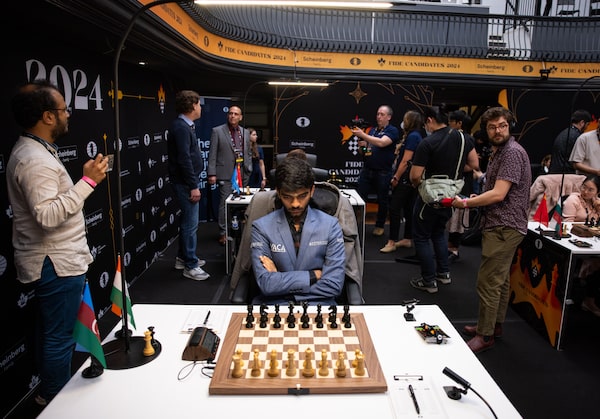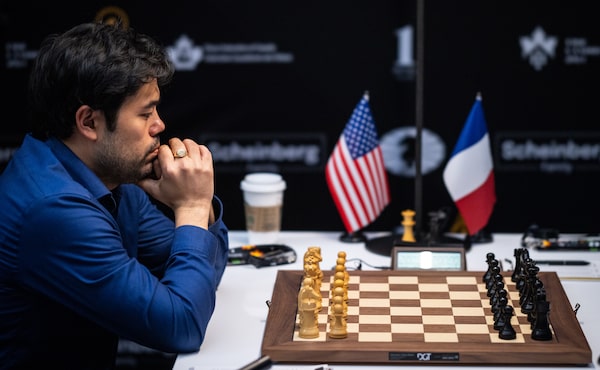The black shuttle bus creaks to a stop in a puddle along Queen St. in Toronto, and a dozen drenched autograph hounds holding chess boards crowd around.
The side door slides open and the brother-sister duo who represent the future of an ancient game stare out at the maelstrom of fans blocking their path. They need to get to the front doors of The Great Hall, the creaky Toronto heritage building currently playing host, from Apr. 3-22, to the most important international chess tournament of the year.
The siblings contemplate their next move.
Vaishali and Praggnanandhaa Rameshbabu, aged 22 and 18 respectively, are the first brother and sister to play in the vaunted FIDE (the French acronym for the World Chess Federation) Candidates Tournament, the winner of which goes on to challenge the current world champion in a head-to-head match.
Five of the 16 players in this year’s 14-round tournament hail from India, an unprecedented number for a country that didn’t produce its first grandmaster, the highest ranking in chess, until 1988. Questions concerning possible Indian supremacy in the sport now start with when, not if. In that context, the Rameshbabu siblings represent the game’s evolution.
Quiet, studious and devout, they also represent something of a throwback to a pre-pandemic time when YouTube videos and X posts didn’t dominate conversation about the sport.

Dommaraju Gukesh of India waits for his opponent before the start of round 12. Five of the 16 players in this year’s tournament hail from India, an unprecedented number of entrants from the country.
During the pandemic, chess went a bit bonkers. Distancing restrictions that kept people housebound and the hit chess drama The Queen’s Gambit drew millions of new players to the board. Chess.com, the most popular online platform, has grown from 30 million users to 150 million in the last four years. A whole side industry of video streamers has emerged to engage all those eyeballs with endless live games, recaps and amateur cheating investigations.
Amid this shift, a succession crisis is taking place. Norwegian Magnus Carlsen, the greatest player of the last decade (and possibly of all time), declared in 2022 that he was bored of world championship play and bowed out of the competition. Last year, China’s Ding Liren took the championship, but he lacks the aura of invincibility surrounding past legends.
The same has been said of current women’s division champ Ju Wenjun, also from China, though she has held the title since 2018.
This is precisely the kind of noise most players try to avoid heading into big tournaments. And the Rameshbabus are up to the moment, thanks in large part to the constant presence of Nagalakshmi, dubbed “super mom” in the Indian press.



“Clearly they draw a lot of psychological support from their mother,” said Vishy Anand, the Indian grandmaster who won five world championships from 2000 to 2012, inspiring the current wave of players in the country. “They’re very close as a family and I think they draw some strength from that.”
The devout Hindu family had spent this April morning in a hotel with their mother, praying and chanting mantras together, a lifelong ritual that has become especially important for blocking out the many distractions of the modern game. With their minds attuned to the matches ahead, they weren’t keen to sign autographs in a downpour outside The Great Hall.
Mercifully, a welcome flank attack comes walking down the sidewalk in the form of Hikaru Nakamura, perhaps the world’s most popular chess player thanks to a lucrative video-streaming empire and a world number-three ranking. The autograph seekers turn toward him instead.
The Rameshbabus make a break for the venue’s front doors, sneaking past fans while Mr. Nakamura poses. At the top of a set of worn red-carpet stairs, they part ways. Nagalakshmi heads for the venue’s VIP room, where she will spend much of the next few hours praying. Her children walk toward the game floor.
It has been this way for 15 years, since they started travelling to international tournaments from their modest home in Chennai, located in southeastern India.

Russia's Ian Nepomniachtchi faces Praggnanandhaa Rameshbabu during their round 12 match on Thursday.
Nagalakshmi first enrolled Vaishali in chess lessons at age five as a way of diverting her from screens, the very medium many of her contemporaries now seek to flood with content. She sought out a few recreational opportunities, but chess classes happened to be closer to their home than any cricket pitch or badminton court.
Vaishali showed an innate aptitude, eventually winning the World Youth Chess Championship for under-12 girls in 2012.
Intrigued by his sister’s obsession, Praggnanandhaa – or just Prag, as he’s more often called – started playing at age three. By age 12, he had become a grandmaster, the second-youngest person at the time to achieve the lofty designation.

Nagalakshmi Rameshbabu, mother of rising chess stars Vaishali and Praggnanandhaa Rameshbabu, watches her children compete in the tournament on Thursday.
Nagalakshmi was always there for spiritual and nutritional support, often travelling with a hot plate and spices to fuel her kids with home-cooked dosa.
During the FIDE World Cup in Azerbaijan last year, an image of Nagalakshmi wiping tears of joy with her sari after Prag won a match to enter the semi-finals went viral. Today, she’s recognized on the street just as often as her kids.
“They are not just the most famous chess players, but among the most famous sports people in the country,” said Sagar Shah, chess journalist and co-founder of Chessbase India, a media platform that follows the country’s chess scene.
On their way to the game floor, players enter a security screening area, where they are scanned for phones, watches and any other possible cheating aids hidden anywhere on the body. It is an unfortunate precaution that’s necessary given recent cheating allegations, the most tawdry of which devolved into broadcaster Piers Morgan asking a young grandmaster on air if he’d ever used remote vibrating anal beads to cheat while playing chess.

Hikaru Nakamura of the U.S. waits for his opponent before the start of round 12. Nakamura mastered the game and its online iterations, and has two million followers on both his Twitch and YouTube channels.
After getting the nod from security, Prag sits down across from his round 11 opponent, Mr. Nakamura. They shake, and settle in for four hours plotting pieces around the board. The two are a study in chess’s contrasting personalities.
Mr. Nakamura is an indefatigable American who mastered the game and its online iterations. He has two million followers on both his Twitch and YouTube channels. “I’m a streamer first,” he said during an opening interview at the event. “Creating content is what I do to earn a living. Playing chess is somewhat secondary from the standpoint of being a professional player.” He earned $284,527 playing 13 tournaments last year, according to chess.com, but says his online activity is “far more lucrative.”
By comparison, Prag offers interviewers one-sentence answers. Sometimes one word. Asked what he does on the tournament’s rest days, he says, “Rest.”
The game arena is a sensory deprivation chamber. Heavy curtains block out all natural light. Only the HVAC’s whoosh is audible. (A full-fledged chess scandal erupted in round 9, when one player complained formally that another competitor was walking too loudly.)
Playing with black pieces, Mr. Nakamura controlled the game early and never let up. While Prag had several opportunities to force a draw, he opted for complex moves to keep chances of a win alive, but it wasn’t to be. He returns to the hotel early.

Vaishali Rameshbabu emerged victorious against Aleksandra Goryachkina, a top Russian player.
Vaishali, meanwhile, emerged victorious against Aleksandra Goryachkina, a top Russian player.
After the match Nagalakshmi considered how she would deal with her children that night, one upset, the other euphoric. “Special attention will be given to the player who lost the game,” she said in Tamil, her daughter translating.
Will she treat him to something from the hot plate?
“That’s a secret,” she laughs.
Her simple advice for raising prodigies: “Whatever field the child chooses, the parent should not put any pressure,” she said. “They should just enjoy it. They just have to let it go.”
At the end of a long day, she and Vaishali sit on a Great Hall bench talking in whispers to one another, their foreheads almost touching. A security guard tells them a shuttle has arrived. They walk quietly down the old stairs and back into a sea of autograph seekers.
 Patrick White
Patrick White